I have two sets
a[i]={'aaa@','bb','ccc@'}
b[j]={'aaa','bb@','ccc@'}
I want to compare each string in a[i] with b[j] such that if both strings are same and they have special character at end then it prints "equal" like ccc@ in above lists are same if strings are equal but one of them have a special character then it displays "Not completely matched"
